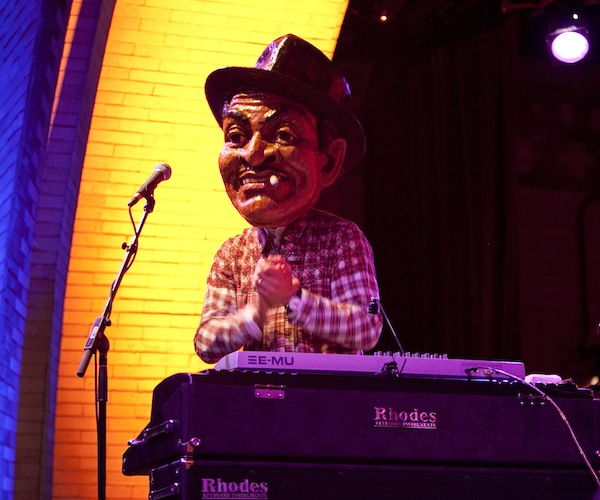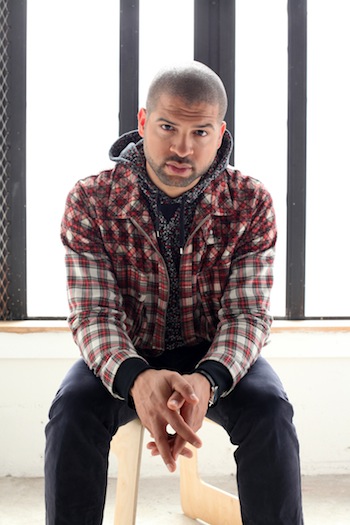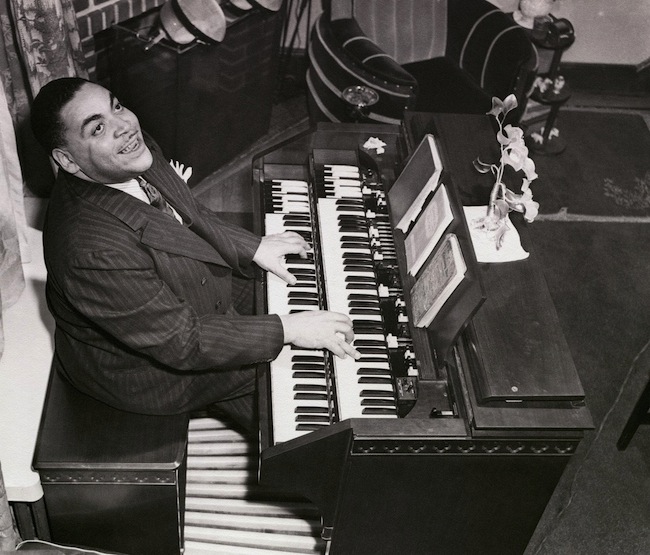Music Interview: Pianist Jason Moran Plugs into the Powerhouse, Fats Waller
“I love Fats Waller. Fats Waller will always be here because he is simply that magnetic a person(a). He’s a figure that remains important to the sound of American music as it continues to evolve.”

Jason Moran wearing a mask of the eponymous inspiration for the “Fats Waller Dance Party.” Photo: John Rogers.
By Bill Marx
Of course you know how he sounds — you’ve heard him on records — but still you need to see him. He’s going all the time, like skating around the skating rink or rowing a boat. It makes everybody crowd around, here in this shadowless steel-trussed hall with the rose-like posters of Nelson Eddy and the testimonial for the mind-reading horse in handwriting magnified five hundred times. Then all quietly he lays his finger on a key with the promise and serenity of a sibyl touching the book.
That’s Eudora Welty, in her 1941 short story “Powerhouse,” trying to convey the oversized vitality of stride pianist and composer Fats Waller performing for an all-white crowd in the segregationist South. Everything was gargantuan about Fats — he composed hundreds of songs, made over 400 recordings, and wrote several Broadway shows. He was five feet eleven inches tall and weighed in at around 285 pounds. He was one of the greatest entertainers of the 20th century, though I speak as a lifelong Fats fan whose heart leaps at the sound of “Your Feet’s Too Big.”
It is Waller’s ferociously inventive exuberance, a showmanship that combined impish physical clowning with verbal and musical improvisation, that is often missing in the various well-meaning homages to his genius, such as the Broadway show Ain’t Misbehavin’. Fats was a joyful life force, so I have high hopes for the celebrated pianist Jason Moran and his Fats Waller Dance Party (a collaboration with singer-songwriter, rapper, bassist, and vocalist Meshell Ndegeocello), which is coming to the Berklee Performance Center this Friday (April 4th), courtesy of the Celebrity Series. Moran wears a Fats Waller mask at times, no doubt to channel the great one’s antic spirit as he gleefully slices, dices, and scrambles up the master’s songbook. Admiring reviews of earlier performances enthuse about how Moran, the band, and the dancing got the joint jumpin’.
I sent Moran, winner of numerous awards and honors, including a coveted MacArthur “Genius” Fellowship in 2010, a few questions via e-mail about the whys and wherefores of the Fats Waller Dance Party.
Arts Fuse: Why are you paying homage to Fats Waller now? Is he in danger of being forgotten?

Pianist Jason Moran — he’s passionate about Fats Waller, the man and his music. Photo: Clay Patrick McBride.
Jason Moran: This all began as a commission by the Harlem Stage. They were producing a series of concerts surrounding great jazz figures in Harlem. They asked if I would consider Fats Waller. I love Fats Waller. Fats Waller will always be here because he is simply that magnetic a person(a). He’s a figure that remains important to the sound of American music as it continues to evolve. So, I do this out of pure passion for the man and his music, and I hope that passion comes through in the performance.
AF: Do you see any similarities between another of your favorite pianists, Theolonious Monk, and Fats Waller? Monk performed a terrific version of “Lulu’s Back in Town.”
Moran: Well, I have many favorite pianists, and a major characteristic is revealed in how each of them works their 10 fingers to manage something different from the millions of other pianists walking the earth. Thelonious was a stride pianist, and accepted by the the kings of stride, Willie the Lion Smith, Art Tatum, James P. Johnson, etc. So, a pianist that knows how to use both hands is important, and a stride pianists’ left hand sounds like drums that make audiences shake/dance. Also, Monk and Waller are so iconic not only with sound, but with image too. From Monk’s many hats and dances, to Waller’s wild banter and raised eyebrows.
Plus my teacher, Jaki Byard (Worcester, MA) loved Waller and literally put the sound of Waller into my hands during our lessons back in the mid-90s. I’d never predict that 15 years later I’d be thinking about Fats Waller so seriously. Thank God for Jaki Byard.
AF: Rather than elaborating on Waller’s swinging stride piano and vocals, you break down his melodies and riffs and then, according to the New York Times, “the band built on those fragments, in rhythms coming out of 1960s-and-beyond dance music: Motown, house, hip-hop.” Could you talk about this time-tripping approach?
Moran: Well, I think of it as live sampling of Waller. I look at shards of phrases and magnify them, and let them take over the piece. Like at the very end of “Ain’t Misbehavin,” he says “For You For You For You,” and I decided to make my remix all about his uttering of “For You.” And add to that Meshell Ndegeocello moving the lyrics around with the same freedom that I do his piano phrases. It’s fun.
AF: What does Meshell Ndegeocello bring to the party?
Moran: Meshell actually knows how to dance. She loves house music, going to clubs, and most importantly she loves making people feel good while also being completely contemplative. It’s like she’s saying “Have fun, but address some of your issues, and this music may heal you.” I love her voice, and her bass craft. She’s a true genius, able to flip a song by the slightest suggestion of a word, or note. This piece isn’t possible without her intervention.
AF: Why do you use a Fats Waller mask during the performance?
Moran: There are lots of reasons, and I won’t divulge all of them. It’s very spiritual. It’s a celebration for a man that has departed in body, but not in spirit. When I realized I needed a mask, i saw that there were no jazz masks. I live in a house with many tribal masks, and consider some of myself part of a tribe of musicians. And Fats was a chief. So, i commissioned a great artist, Didier Civil to create the mask for this performance.
AF: One of my favorite things about Fats is his witty verbal improvisations, which he often used to enliven mediocre tunes. Do you attempt to duplicate that in performance?
Moran: Meshell has figured out some ways of getting some of his lyrics to take on an entirely different tone. It all continues to morph.
AF: What are some of your favorite neglected Waller performances? A couple of mine are the instrumental “Latch on,” which ends with Fats uttering “the way of all flesh,” and the lazy sexual innuendo of the song “Too Tired.”
Moran: Well, I love those piano solos. Solos within tunes, or solo piano pieces. “African Ripples” is a great one. And then there is the double piano stuff with his teacher/mentor James P. Johnson.
Bill Marx is the Editor-in-Chief of The Arts Fuse. For over three decades, he has written about arts and culture for print, broadcast, and online. He has regularly reviewed theater for National Public Radio Station WBUR and The Boston Globe. He created and edited WBUR Online Arts, a cultural webzine that in 2004 won an Online Journalism Award for Specialty Journalism. In 2007 he created The Arts Fuse, an online magazine dedicated to covering arts and culture in Boston and throughout New England.
Tagged: Celebrity-Series-of-Boston, Fats Waller, Fats Waller Dance Party



Did I tell you my son and I contacted Jamo through Twitter to tell him we were coming to see him in DC last November, and he replied asking for requests? We sent one, and in a show of only 7 tunes he played it! Met him afterwards. WOW
Just got back from NY, where I saw Fabian Almazon at Jazz Standard. Do investigate!